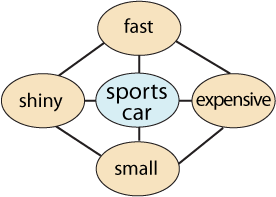

Cognitive Schemas
Schemas are comprised of an individual's organized general knowledge about a particular concept that has accumulated from one's similar past experiences. Schemas serve as structured expectations about a particular stimulus that may consist of a situation, event, person, place, or etc. There are many different types of schemas such as the Person Schema (describes the personalities of others), Event Schema (way in which one approaches tasks or problems), and Role Schema (how one expects someone occupying a particular role to act). For example, in a restaurant schema the role of the hostess would be to ask the potential customer "How many?" people will be dining with the them.
Schemas also allow one to readily process the complexities of newly learned information and retrieve relevant stored information which helps one to be more productive during information processing and decision making. Schemas are similar to heuristics because they abide by general rules that are typically accurate, but the two are different. Therefore one can approach new situations and predict the outcome rather accurately. However, if one's schemas are too strictly constructed and do not allow for the contemplation of new ideas this can be very problematic. If one's schemas are to rigid this can lead to stereotypical thoughts and incorrect conclusions.
Ex: Restaurant Schema


Links
1) Why Effective Word-of-Mouth Disrupts Schemas
This article explains how advertisements rely on disruptions of schemas to sell products.
2) SOCIAL COGNITION & COGNITIVE SCHEMA
Explains some different types of schemas and their functions.
3) Emotion Schemas
Explains the development of emotion schemas.
4) Schemas and Stereotypes
Discusses how schemas can contribute to the persistence of stereotypes.
5) Jean Piaget
Describes schemas and how they apply to Jean Piaget's Theory of Cognitive Child Development.
6) The Organization of Knowledge
Discusses the effects new knowledge can have on one's existing schemas.
7) Schemas
Maps the interconnected functions of schemas as pertaining to semantic memory.
8) Accommodation & Assimilation of Schemas
This video shows a representation of how children form schemas through the processes
of accommodation and assimilation.
9) Critical Issue: Eyewitness Testimony
Explores the works of multiple theorists and explains how schemas can interfere with eyewitness
testimonies.
10) Difference Between Schema & Heuristic
Explains the difference between a schema and a heuristic.
This wiki page was created by Vanesha Brown.
*** To my knowledge, all of the images I have used are public images. If there are any issues with the work I have published, please email me at 10781952@live.mercer.edu and I will make the necessary changes. ***
Comments (0)
You don't have permission to comment on this page.